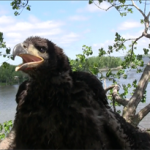
An eaglet in its nest. Photo from Wisconsin Department of Natural Resources.
A National Parks Service research project monitoring environmental contaminants via testing baby eagles’ blood and feathers was featured in a June 8th Milwaukee Journal-Sentinel article.
Wisconsin State Laboratory of Hygiene (WSLH) at UW-Madison scientists provide testing for this project.
The WSLH Organic Chemistry Section tests the eaglets’ blood for contaminants such as PCBs, PFCs, pesticides, flame retardants and other industrial chemicals, while the Clinical Metals Section tests the blood samples for lead.
Eaglet feathers are tested for lead in the Trace Elements Clean Laboratory and for mercury in the Metals Lab.
From the story –
“Eaglets are perfect for the study because they’re the ultimate locavores. Their parents bring food acquired a short distance from the nest, giving authorities a good insight into nearby contaminants, said Bill Route, an ecologist with the Great Lakes Inventory and Monitoring Program for the National Park Service.”
